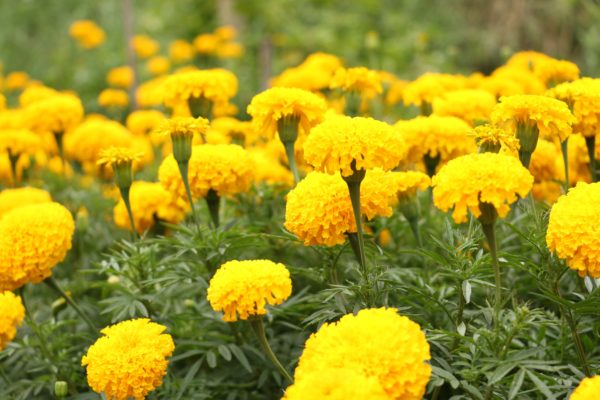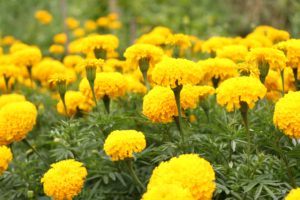Be-a-Better-Gardener
Just a Pinch of Flowers
By Thomas Christopher
Marigolds are genetically programmed to expire after they go to seed, but deadheading them short-circuits this process, yielding more flowers throughout the season.
Say the word “pruning” and the mind turns to saws and loppers, and trees and shrubs. But pruning plays just as essential a role in the flower garden. Of course, the techniques are different. In the flower garden we depend on a pinch or maybe the snip with a sharp pair of bonsai shears. The effects, though, can be just as dramatic.
For example, consider annual flowers. Unless you start them from seed yourself – which, alas, few of us do anymore – you are forced to buy transplants at a garden center or big box store. To boost the sale of these transplants, the retailers prefer them to already be in bloom when they set them out on the shelves. But transplants already sporting flowers are unlikely to flourish when you put them out in the garden beds or containers. That’s because once they start the flowering process, a chemical change takes place in the plants that causes them to devote their energy to producing more blooms, rather than growing leaves and stems. The result is that the already-blooming transplants won’t expand into the bushy, larger plants you’d prefer.
Fortunately, it’s easy to reset the clock. Pinch your transplants back, removing the flowers and their stalks just above a node where a leaf or leaves attach to the stem. This will release the growth of dormant vegetative buds along the stem and in this way encourage the transplant to branch and send up new stems. A subsequent pinching of these new stems may be indicated to encourage them in turn to branch. Fertilize with a balanced, water-soluble fertilizer such as a 10-10-10 product or its organic equivalent, and you’ll be well on your way to a more satisfying garden display.
Timely pruning of this sort is equally useful in the perennial garden. Pinching back late-season flowering perennials, such as hardy chrysanthemums, phlox, asters, Joe Pye weed, Russian sage and the unfortunately named sneezeweed, which I prefer to call by its botanical name Helenium, encourages more compact and floriferous growth. The first pinch comes when the plants are 8 to 10 inches tall; take the shoots back by a third. Repeat this treatment every two to three weeks until July 4th. The result of this treatment will not only be more stems and more flowers, the compact plants that result should not need staking to keep them from flopping.
Another use for your fingertips and fingernails (if gardening has left you with any nails) is “deadheading.” This somewhat ominous sounding word refers to the process by which flowers are removed as they start to wither and go to seed. Letting this proceed unchecked is fatal to true annuals, such as zinnias and marigolds, which are genetically programmed to expire after they go to seed. Perennials, including the frost-sensitive perennials such as coleus, impatiens, and petunias that we northerners cultivate as annuals, won’t die if they go to seed, but, having fulfilled their reproductive imperative, they will stop blooming prematurely.
To short-circuit this aging process, make a daily patrol of the flower garden part of your routine, and snap off any fading flowers you spy. A pinch should do the job, unless the particular plant’s stems are wiry and tough, in which case you may have to resort to a sharp pair of shears – I find bonsai shears ideal for this.
Needless to say, this sort of work takes its toll on your manicure. I keep waiting for some enterprising individual to start marketing fingernail extensions of a rugged sort – stainless steel, perhaps – designed for gardeners.
I’ll take mine in green, at least for my thumbs.
Thomas Christopher is the co-author of “Garden Revolution” (Timber Press, 2016) and is a volunteer at Berkshire Botanical Garden. berkshirebotanical.org
Be-a-Better-Gardener is a community service of Berkshire Botanical Garden, one of the nation’s oldest botanical gardens in Stockbridge, MA. Its mission to provide knowledge of gardening and the environment through 25 display gardens and a diverse range of classes informs and inspires thousands of students and visitors on horticultural topics every year. Thomas Christopher is the co-author of Garden Revolution (Timber press, 2016) and is a volunteer at Berkshire Botanical Garden. berkshirebotanical.org.




